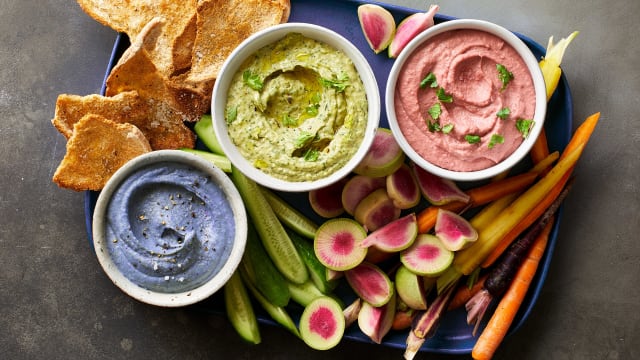Spices for Gut Health

Spices are often thought of as magical healing ingredients in the food world. And our gut is the place where the alchemy for emotional and physical health happens. Together, they can often define our wholistic wellbeing.
Spices are aromatic plant substances derived from barks, roots, and seeds. They can be consumed whole or added in powdered forms to our foods. There are many spices that improve gut health, with compounds that support the growth of beneficial bacteria and improve digestion. One study showed “even a single meal containing mixed spices can modify/restore gut microflora within a period of 24-48 [hours]”.
Indian nutritionist Payal Kothari writes in her book, The Gut: The Story of Our Incredible Second Brain, that spices are “superfoods in our kitchen” and one of the easiest ways to help build immunity and gut health through food.
Adding specific spices to our diets increases those gut bacteria that promote healthy digestion and absorption of nutrients. Many Asian, Indian, Middle Eastern, and Mediterranean cuisines consider spices to be medicinal ingredients and use them for their healing properties.
Spices and digestion
According to Kanchan Koya, author of Spice Spice Baby who has a doctorate in molecular biology from Harvard, “Your gut is central to your health and wellbeing” as “the only place in your body that encounters the external world through the food you eat.” She believes “spices are a treasure trove of health and healing,” and adds them to foods as a flavorful, delicious way to reset gut health.
Kanchan Koya’s spiced chia pudding
Both modern science and ancient medicine systems like Ayurveda list the many ways that different spices can contribute to gut health. Here are a few examples:
Spices can help to reduce inflammation in the gut
Inflammation is a healthy immune response that can sometimes continue, causing pain and other symptoms, even in the absence of a threat to health. Many spices, such as turmeric, ginger, and cinnamon have anti-inflammatory properties that can help reduce unchecked inflammation in the digestive system, reducing the risk of certain digestive disorders.
Spices can improve digestion
Some spices, such as ginger and fennel seeds, have traditionally been used to help reduce bloating and digestive discomfort, as well support the absorption of nutrients.
Spices can support the growth of beneficial bacteria
Spices contain prebiotics which promote healthy gut bacteria. Some spices, such as cardamom, have antimicrobial properties that help protect food from the growth of pathogenic bacteria. This can support the growth of beneficial bacteria in the gut, improving the balance of the gut microbiome.
Spices can provide a range of nutrients
Many spices are rich in a variety of micronutrients and trace minerals (such as iron, manganese, zinc, magnesium, and copper) that are important for gut health.
Incorporating a variety of spices into your diet can help ensure you are getting a wide range of these nutrients.
Spice list
Here are a few examples of spices that are good for gut health, along with some of their nutritional benefits:
Turmeric
This spice contains curcumin, a powerful antioxidant that has anti-inflammatory properties. Besides improving gut health and aiding digestion, it is also a good source of iron and manganese.
Pepper acts as a prebiotic, aiding healthy microbiome in the gut. Its active compound, piperine, aids to activate digestive enzymes and helps in digestion.
Ginger
The rhizome has been shown to have anti-inflammatory properties, and contributes to “gastrointestinal motility” to reduce bloating and digestive discomfort. It is also a good source of potassium and magnesium.
Cinnamon
This spice with antimicrobial and antioxidant properties may help improve digestion and reduce gut inflammation. It is also a good source of trace elements like manganese and iron that “modulate gut bioenvironment,” impacting immunity and stress levels.
Cardamom
Traditionally used to improve digestion and reduce bloating in many cultures, cardamom is also a good source of potassium, iron, and magnesium.
Fennel
Fennel has been used for centuries as a digestive aid, and its seeds may help reduce bloating. It is also a good source of potassium, calcium, and vitamin C.
Cumin
Some research suggests cumin stimulates the production of enzymes that help break down food in the digestive system, which can improve overall digestion. It also has antioxidant properties that help protect against gut inflammation.
Adding spices to a variety of plant-based foods in your diet can provide a wide range of nutrients crucial for gut health.
Best ways to add spices
Spices offer different benefits when cooked in a variety of ways. Here are several ways you can cook spices to support gut health:
- Temper the spices by heating them in oil: This allows the flavors to fully bloom and distribute throughout your dish, and releases fat-soluble compounds.
- Dry roasting: This can be done on the stovetop, in a pan, or in the oven. According to doctor and nutritionist Dr Nandita Iyer, dry roasting helps to release essential oils and enhances flavor.
- Make a spice tea: Some spices, such as ginger and turmeric, can be steeped in hot water or milk to create beverages that aid digestion.
- Add spices to marinades: Spices can help tenderize and add flavor to dishes.
Spice trials
There are many simple ways to add spices to your recipes to support gut health:
- Add ginger to smoothies, teas, and soups, or used as a seasoning for meats and vegetables.
- Add turmeric to soups, stews, stir-fries and curries, or used to season roast vegetables.
- Add cinnamon to oatmeal, smoothies, teas, and baked goods.
- Fennel seed is a natural digestive aid, and can be added to salads, roast vegetables, condiments, or used to make tea.
- Add cloves to marinades, spice blends, teas and baked goods.
- Cardamom has a warm, sweet flavor, and can be added to coffee, tea, and baked goods, or used to season meats and vegetables.
Nutritionist and dietitian Keri Romerdahl says, “Shop for organic products to really extract as much medicinal value from your spices and check the shelf life of spices to gain maximum benefits.”
Kanchan Koya's Cilantro Butter Bean Veggie Stew
Including a variety of spices in your diet can help to support gut health in a number of ways. It's important to note that everyone's gut is unique, and what works for one person may not work for another. Resetting your gut can give a boost of energy and positive outlook. It's always a good idea to consult with a healthcare professional before making any significant changes to your diet.
Key Takeaways
- Spices boost healthy gut bacteria growth.
- Spices reduce bloating, aid digestion.
- Spices control inflammation.





